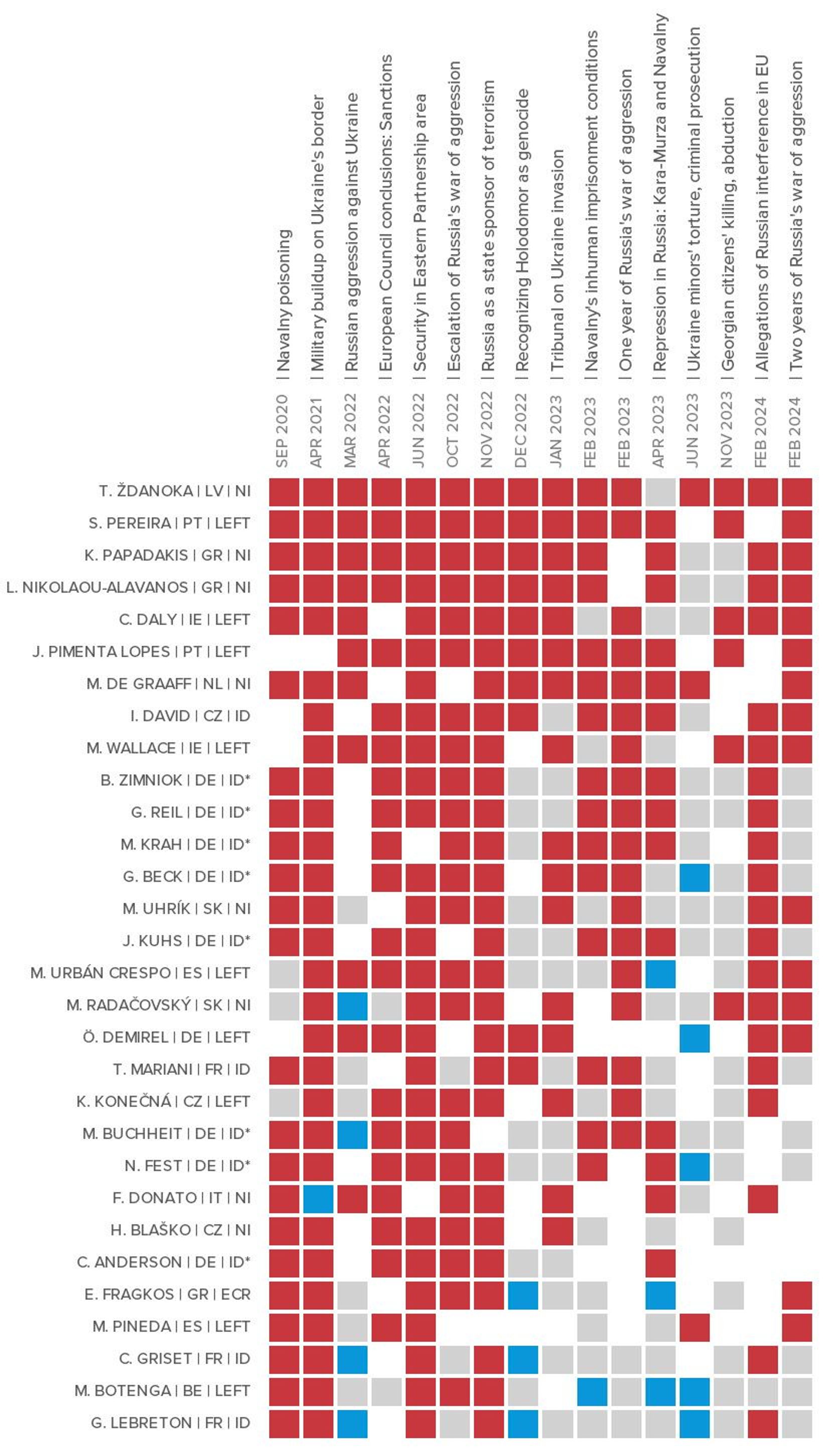
Cover photo: Tatjana Ždanoka / Vida Press
Over the past four years, the European Parliament (EP) has adopted 16 resolutions condemning various actions taken by Russian authorities in both the domestic and foreign policy spheres. Among members of the Strasbourg-based body, Latvian representative Tatjana Ždanoka has emerged as the primary defender of Vladimir Putin's regime, voting against the resolutions 15 times and abstaining once, according to a recent analysis published by Politico and highlighted by the Latvian outlet Delfi.
Since 2020, these resolutions have condemned the Kremlin for actions including the poisoning of opposition politician Alexei Navalny, the full-scale invasion of Ukraine, repression of political opponents, deportation of children from occupied Ukrainian territories, and attempts to interfere in the EU’s internal affairs. These documents typically garnered overwhelming support from the majority of MEPs.
After analyzing the results of votes on each of the 16 resolutions, Politico compiled a list of the 30 Members of European Parliament (MEPs) who most frequently opposed or abstained.
Leading the list was Latvian MEP Tatjana Ždanoka, who voted against the resolutions 15 times and abstained once — in April 2022, during a vote on a resolution against the repression of Alexei Navalny and other political prisoners in Russia.

Between 2020 and 2024, MEPs cast votes on at least 16 resolutions that were critical of Russia. A red square represents an opposing vote; grey represents an abstention; blue is a "Yes" vote. Lawmakers are ordered by the number of opposing votes, then abstentions.
Source: Politico
In late January of this year, a joint investigation by The Insider, Delfi Estonia, Latvia’s Re:Baltica investigative journalism center, and Sweden’s Expressen newspaper, revealed that Ždanoka was an agent of Russian intelligence, working on behalf of the FSB’s Fifth Service and reporting to two different handlers from at least 2004 to 2017.
Another joint investigation by The Insider and Re:Baltica published in May examined close to 19,000 of Ždanoka’s emails detailing how she served the Kremlin’s interests while purportedly fulfilling her duties as an MEP representing Latvia. For instance, she had been dispatched to Kyiv as part of a parliamentary fact-finding delegation from the EP during the Euromaidan protests in January 2014, but did not report back to her colleagues in Strasbourg — instead, she sent a confidential report to her FSB handler Sergey Beltyukov, stating her view that anti-Yanukovych demonstrators, already stretching well into their second month, were unlikely to disperse in the near future.
She also sent her handlers sensitive information from critical European meetings regarding the Eastern Partnership (EaP) — particularly those that concerned the potential Western accession of countries within the Kremlin’s self-proclaimed “near abroad.”
Ždanoka, who is not standing for re-election, denied being an agent of the Kremlin, saying: “Yes I am an agent, an agent for peace.” The European Parliament conducted its own probe into the allegations and found her in breach of the MEPs’ code of conduct, a violation that was punished with a fine of €1,750. Latvia's State Security Service (VDD) also initiated a probe but has so far declined to comment on its findings.
Most of the other deputies on Politico’s list are from Western European countries and come predominantly from far-right and far-left parties.
For instance, Maximilian Krah, the controversial lead candidate of the far-right Alternative for Germany (AfD), halted his campaign and relinquished his AfD leadership role following multiple scandals. He did not support any texts criticizing Russia, and other AfD lawmakers largely mirrored his voting record.
Dutch far-right MP Marcel de Graaff, who along with Krah was implicated in scandals related to the Kremlin's Voice of Europe propaganda project — and whose assistant is embroiled in a Russian propaganda probe — was even more radical, casting 12 votes against with four instances of absence, essentially voting “no” in every anti-Russia vote he attended.
Politico noted that the voting records of political alliances within the EP reflect “deep divisions” when it comes to resolutions condemning the Kremlin. For example, in the right-wing Identity and Democracy (ID) faction, MEPs from the AfD (before their expulsion from ID last month over Krah’s actions) typically abstained or voted against the resolutions. However, representatives from France's Rassemblement National (lit. “National Rally) supported one quarter of the resolutions analyzed by Politico, while those from Italy's Lega (lit. “League”) ventured even further into the anti-Kremlin camp, fully supporting all 16 texts criticizing the Russian authorities.